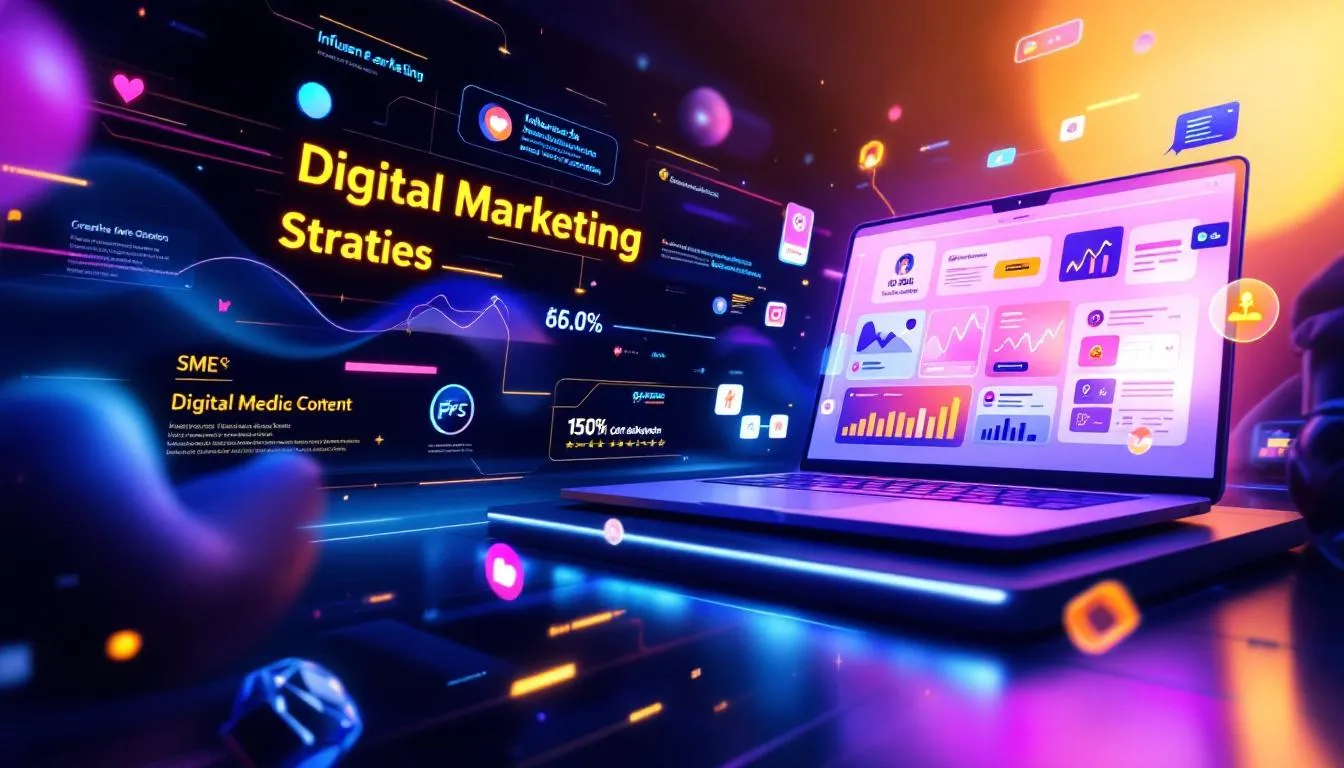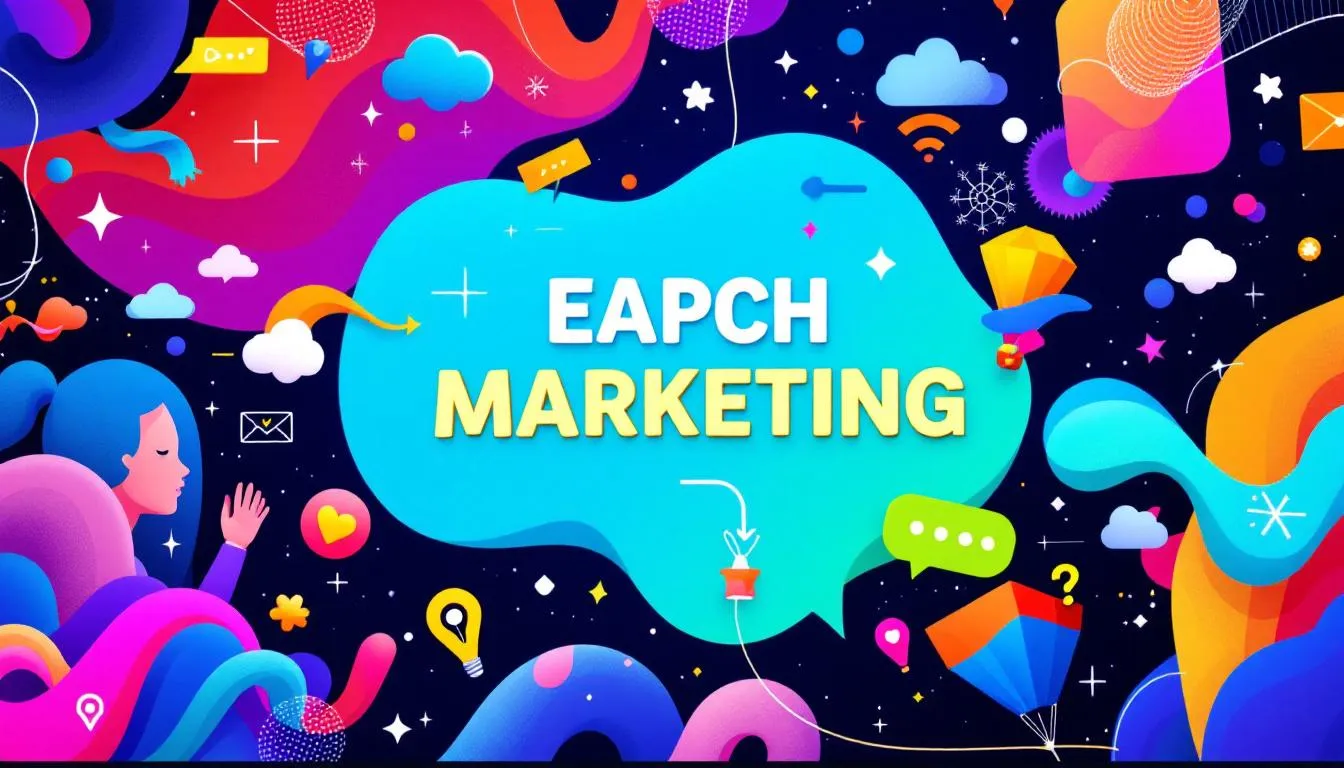Are you wondering how an SME agency can help your small business succeed in digital marketing? SME agencies specialize in guiding small and medium-sized enterprises through the complex digital landscape, helping them achieve significant growth with limited resources. Digital marketing has completely changed the marketing landscape for SMEs, offering them innovative ways to compete with larger businesses. An SME agency supports Small and Medium-sized Enterprises (SMEs) by helping them access public sector contracts, remove regulatory barriers, and promote their growth and innovation. Additionally, SME agencies provide services like market access, tailored advice, best practices, improved procurement processes, and sometimes direct financial support or grants. This article delves into top digital marketing strategies for SMEs and how an SME agency can implement these strategies for your business.
Key Takeaways
-
Understanding your target audience is key for SMEs to maximize ROI and create effective digital marketing strategies. Creating detailed customer profiles helps in understanding their needs and preferences.
-
Leveraging multi-channel marketing and engaging content is essential for SMEs to enhance brand awareness and connect with potential customers.
-
Consistent branding and community engagement can foster loyalty, drive repeat business, and establish a strong identity in the competitive digital landscape.
Understanding SME Agencies

Small and medium enterprises, or SMEs, are businesses with limited resources compared to larger corporations. SME digital marketing encompasses the efforts of these small and medium-sized businesses to reach their target audience online, often with the guidance of specialized agencies. These agencies play a vital role in helping SMEs compete effectively in the marketplace by leveraging high-ROI digital marketing strategies. Imagine having the expertise to navigate the complex digital landscape without the hefty budgets of larger corporations—this is where SME agencies come in, ensuring that small and medium enterprises can achieve significant growth as a medium-sized business. SMEs make up 99% of all UK businesses, highlighting their critical role in the economy. A Small or Medium-sized Enterprise (SME) is defined by specific thresholds for employee numbers, turnover, and balance sheet total, which vary by country and international organizations.
Through best practices in digital marketing, SME agencies guide businesses in exploiting all available tools to their advantage. This blog will delve into different types of digital marketing strategies, providing top tips for SMEs to succeed in the ever-competitive digital arena. Notably, 62% of SMEs use paid digital advertising, showcasing its importance in their marketing efforts. In fact, 60% of SMEs use paid digital advertising as a key component of their strategy, further emphasizing its role in achieving visibility and growth in the digital space.
With the right approach, small businesses can level the playing field and carve out a successful niche for their services development in their respective industries. The digital migration accelerated by the COVID-19 pandemic presents unique challenges for SMEs adapting to new technologies, but it also offers opportunities for growth and innovation. Digital marketing is a more affordable and cost-effective way to build brand awareness and drive traffic to websites compared to traditional marketing methods. Cost-effective digital marketing typically offers a higher ROI compared to traditional marketing methods, making it an essential tool for SMEs.
Key Digital Marketing Strategies for SMEs

Digital marketing offers SMEs the opportunity to reach broader audiences and engage customers more effectively than traditional methods. Focusing on high-impact digital marketing activities allows small businesses to enhance their online presence, build brand awareness, and drive growth even with limited resources.
Key strategies include identifying your target audience, leveraging multi-channel marketing, and using content marketing for engagement.
Identify Your Target Audience
Understanding your target audience is crucial for maximizing return on investment in digital marketing. Effective targeting allows SMEs to compete with larger businesses by ensuring that their marketing efforts are directed at the right people. Methods to gain a deeper understanding of the target audience include initial research, researching competitors, writing customer profiles, conducting focus groups, and collecting zero-party data, which is voluntarily provided by customers in exchange for value, to help build detailed customer profiles. Additionally, 63% of B2B customers need to hear company claims three to five times before they believe them, highlighting the importance of an online presence. Most B2B customers will start their research online with a search engine, making it essential for SMEs to optimize their digital presence. Providing educational content can help nurture leads until they are ready to buy, ensuring a steady flow of engaged and informed potential customers.
E-commerce marketing insights provide valuable information about customer behavior and preferences, aiding in understanding the target audience. Key points include:
-
Personalization in marketing can significantly enhance customer engagement by catering to individual preferences.
-
Research indicates that a significant percentage of B2B sales interactions will occur in digital channels by 2025, with Gartner estimating this figure to be 80%.
-
This trend highlights the need for effective audience engagement.
To engage with younger audiences like Gen Z, brands should focus on genuine connections and tailored content. Understanding their target audience allows SMEs to create more effective and personalized marketing strategies that resonate with potential customers. This approach not only helps attract customers but also builds brand awareness and loyalty over time.
Leverage Multi-Channel Marketing
Using multiple digital channels enhances communication with the audience and can lead to better engagement. A multi-channel approach improves visibility, enhances the user experience, and facilitates interaction and feedback. Reaching potential customers across various platforms ensures that SME agencies’ messages are seen by a broader audience. However, SMEs often feel overwhelmed by the multiple digital marketing channels available to them, making it essential to prioritize and strategize effectively.
This strategy allows businesses to build brand awareness and engage with their audience in different ways, increasing the chances of converting leads into customers. Combining social media marketing, email marketing, and digital advertising, for instance, can create a cohesive and comprehensive marketing strategy that maximizes reach and impact.
Content Marketing for Engagement
Content marketing is essential for attracting and retaining an audience by providing valuable information. Social media and email are powerful tools for building audiences and increasing content visibility. For example, A/B testing different marketing messages can help determine which content resonates best with the target audience, ensuring that marketing efforts are effective and engaging. Content needs to be both valuable and clickable to capture attention online, making it a cornerstone of successful digital marketing strategies.
Content marketing allows SMEs to promote their brand, attract customers, and build lasting relationships. Engaging content not only drives organic traffic but also enhances brand recognition, making it a critical component of any digital marketing strategy.
Utilizing Digital Channels Effectively
Not having an online presence can lead to losing potential customers to competitors. It is crucial for potential customers to find a business online, as it significantly enhances reach and allows for targeting customers globally.
SMEs can utilize various digital channels such as organic social media, paid social media ads, and email marketing to communicate with their audience. Key digital marketing methods, including SEO, paid search, content marketing, email, and social media, are essential for increasing online visibility and engaging customers.
Social Media Marketing
Active engagement with the community on social media can enhance brand loyalty and customer relationships. By participating in community discussions and targeting the right audience, businesses can foster deeper connections with their customers. Leveraging social media allows brands to connect with their audience effectively and drive traffic to their websites.
Best practices for social media marketing include consistent messaging, understanding audience preferences, and adapting strategies based on feedback. Following these practices helps SMEs build a strong social media presence that supports their overall digital marketing strategy.
Search Engine Optimization (SEO)
SEO boosts online visibility and improves website ranking in search engines. After launching a website, a key goal is to drive visitors to it and enhance its search engine ranking. Effective SEO increases organic traffic, enhances customer flow, and improves conversion rates.
Optimizing websites for search engines helps SMEs attract more potential customers and achieve better digital marketing results.
Paid Search and Digital Advertising
Effective strategies forpaid advertising for SMEs include:
-
Display advertisements on specific websites
-
Search advertisements based on related search terms
-
Utilizing Bing and Google display ads to significantly improve content visibility
-
Targeted advertising campaigns to reach specific customer segments and yield higher conversion rates
Paid search and digital advertising play a crucial role in attracting new customers and enhancing the online presence of SMEs through targeted campaigns. Investing in paid search and digital ad ensures that SMEs’ messages reach the right audience at the right time.
Measuring Success in Digital Marketing

Measuring marketing results is vital to identify effective activities and optimize marketing efforts. Tools such as Google Analytics and SEM Rush can be used to assess online presence and maximize outcomes. Collecting data on deal closure time and associated costs helps SMEs measure marketing effectiveness and make informed strategic decisions. However, many SMEs struggle to measure the return on investment (ROI) of their digital marketing activities, underscoring the need for robust tracking and analysis tools. SME agencies often provide a data-driven approach that uses data and analytics to track key performance indicators (KPIs) and measure campaign effectiveness.
Track ROI
Tracking ROI is crucial for SME marketers to understand which marketing activities provide the best returns. Key strategies to improve ROI tracking and results include:
-
Charting accurate customer journeys that account for all digital marketing touchpoints.
-
Keeping leads engaged over the long term to achieve the best ROI on a low budget.
-
Maintaining consistency in branding to build recognition and loyalty, which can positively impact ROI.
Focusing on ROI ensures that SMEs’ marketing investments deliver the desired results and drive results in business growth.
Analyze Customer Behavior
Tracking digital marketing success helps SMEs identify high-performing strategies and improve return on investment. Techniques for analyzing customer behavior include tracking metrics that reveal customer engagement and preferences. A deeper understanding of customer behavior allows SMEs to tailor their marketing efforts, leading to enhanced customer satisfaction.
Analyzing customer behavior enables SMEs to create more personalized and effective marketing campaigns that resonate with their audience.
Optimize Campaigns
Continuous campaign optimization allows for adjustments based on performance metrics to enhance effectiveness. Continuous optimization of campaigns based on performance data ensures that marketing efforts are aligned with business objectives.
Regularly optimizing campaigns helps SMEs improve their marketing performance and achieve better results.
Building Brand Awareness and Recognition

Establishing a strong new brand identity helps SMEs differentiate themselves from competitors. Digital marketing has made brand awareness more accessible to global audiences 24/7. Effective brand awareness can keep a business top-of-mind for potential customers even when they’re not actively seeking to buy.
Key components contributing to brand recognition include website, name, design, and site consistency.
Consistent Branding
Maintaining a consistent mobile brand image across platforms fosters stronger connections with the audience. Unified messaging across various platforms enhances customer trust and recognition.
Engaging content on social media can significantly amplify brand presence and customer interaction.
Influencer Partnerships
Influencer marketing increases brand awareness and aligns with Gen Z. Finding the right creator is crucial when selecting an influencer for a campaign. Partnering with the right influencers can enhance credibility and reach within target demographics.
Effective influencer collaborations can tap into niche markets and enhance brand authenticity.
Community Engagement
Engaging with the community through social media can foster meaningful relationships between SMEs and their customers. Utilizing polls, interactive content, and live Q&A sessions on social media can enhance engagement. Strong community engagement leads to increased customer loyalty and trust in the brand.
Establishing a loyal customer base through community engagement yields long-term business success.
Cost-Effective Marketing Solutions for SMEs

Budget constraints often limit SMEs from investing adequately in digital marketing. Affordable strategies are crucial to avoid financial strain for SMEs. Digital marketing offers tailored strategies that can significantly lower marketing costs for SMEs. Interestingly, 81% of SMEs allocate half of their revenue to digital marketing, underscoring its critical role in their overall business strategy.
By utilizing a mix of paid, owned, and earned media, SMEs can enhance their marketing effectiveness.
Email Marketing
Email marketing serves as a direct communication channel, enabling high conversion rates through targeted campaigns. It is a cost-effective channel because it incurs minimal to no costs for sending messages. For effective email marketing, consider using punchy copy, informative content, and eye-catching design. Email marketing creates a direct line of communication between customers and brands, fostering stronger relationships and improving engagement.
Personalization in email marketing enhances customer engagement and improves conversion rates.
User-Generated Content (UGC)
User-generated content (UGC) is content created by users that promotes authenticity and drives traffic. Common sources of UGC include review platforms, social media videos, and hashtags.
Collected insights from UGC can be used to build bespoke, full-funnel campaigns that target consumers individually.
Loyalty Programs
Loyalty programs are designed to encourage repeat business and improve customer retention. By incentivizing customers through loyalty programs, businesses can significantly boost repeat purchases. Positive customer experiences from loyalty programs encourage sharing these experiences with peers, enhancing overall brand visibility. Imagine a customer who feels valued and appreciated—this is the kind of loyalty that can transform a small business into a beloved brand. Offers and discounts are also effective strategies for attracting new customers and complementing loyalty initiatives.
Implementing effective loyalty programs can create a community of dedicated customers who not only return but also become brand advocates. This sense of belonging and reward strengthens the connection between the business and its customer base, driving long-term success.
Overcoming Challenges with SME Agencies
SMEs have faced an uphill battle to survive post-pandemic. Catching the right person’s attention online is a significant challenge for SMEs, as small business owners often feel uncertain about which digital marketing tools provide the most benefit. Ignoring digital marketing needs can lead SMEs to explore options for partnering with a digital marketing agency.
Sound digital marketing practices can lead to improved brand recognition and market share growth.
Limited Resources
Identifying potential resource drains is critical for SMEs to optimize their limited budget and maximize their marketing efforts. To prevent major resource drains, SMEs should avoid common pitfalls, such as implementing too many strategies at once or failing to measure campaign effectiveness. Small and medium-sized enterprises often face challenges in digital marketing due to limited budgets and fewer resources.
Understanding their limitations and focusing on high-impact strategies allows SMEs to successfully navigate the digital marketing landscape despite restricted resources. Concentrating on high-impact activities and utilizing affordable tools enables SMEs to effectively manage resources and achieve marketing goals without breaking the bank.
Keeping Up with Trends
Staying updated with the latest digital marketing trends is crucial for SME agencies to remain competitive. Being aware of emerging trends allows SME agencies to adapt their strategies, meet client expectations, and enhance service delivery. New technologies such as AI and automated tools can improve efficiency and effectiveness in digital marketing efforts.
SME agencies should regularly invest time in training and workshops to effectively integrate new technology into their marketing strategies. Investing in continuous learning and staying ahead of industry trends ensures that SMEs’ marketing efforts remain relevant and impactful.
Managing Multiple Clients
Managing multiple clients effectively is crucial for maintaining quality of service and client satisfaction. Here are some strategies to help:
-
Utilize project management tools to keep track of deadlines, tasks, and client communications.
-
Schedule regular check-ins with clients to allow for open communication and address concerns early.
-
Maintain a consistent branding and messaging strategy to ensure all clients receive quality deliverables.
Creating standardized templates for reports and communications can streamline the process and foster consistency. Incorporating client feedback into ongoing projects is vital for adapting strategies to meet specific needs. By implementing these practices, SME agencies can manage multiple clients efficiently while delivering exceptional results. For an SME agency, every client is regarded as a 'mega-client,' ensuring businesses receive individualized attention.
Summary
In summary, SME agencies can achieve remarkable success in digital marketing by adopting key strategies such as identifying their target audience, leveraging multi-channel marketing, and focusing on content marketing for engagement. Utilizing digital channels effectively, measuring success, and building brand awareness are critical components of a robust digital marketing strategy. Cost-effective solutions like email marketing and user-generated content, along with loyalty programs, can further enhance marketing efforts without straining budgets. Digital marketing strategies should focus on both new and long-term customers, ensuring sustained growth and customer retention over time.
Overcoming challenges such as limited resources, keeping up with trends, and managing multiple clients requires strategic planning and continuous learning. By staying agile and focused, SME agencies can not only survive but thrive in the competitive digital landscape. Partnering with an SME agency provides access to a team of experts with diverse skills without the high costs of hiring and training an in-house team. SME agencies prioritize client relationships, providing more flexible, agile, and customized strategies compared to larger agencies. Embrace these strategies, and watch your SME agency soar to new heights of success.
Frequently Asked Questions
Why is identifying the target audience crucial for SMEs?
Identifying your target audience is crucial for SMEs because it allows you to tailor your marketing efforts effectively, maximizing your return on investment. By focusing on the right people, you can drive growth and achieve your business goals more efficiently.
How can SMEs leverage multi-channel marketing effectively?
SMEs can effectively leverage multi-channel marketing by integrating various digital channels to boost visibility and engage a wider audience. Embrace this strategy to connect with customers where they are and watch your business flourish!
What are some cost-effective marketing solutions for SMEs?
Effective cost-saving marketing strategies for SMEs include leveraging email marketing, encouraging user-generated content, and implementing loyalty programs. These approaches foster engagement and build customer loyalty without breaking the bank.
How can SMEs stay updated with the latest digital marketing trends?
To stay ahead in digital marketing, SMEs should prioritize ongoing training and workshops while keeping a pulse on new technologies and industry trends. This proactive approach will empower you to adapt and thrive in the ever-evolving digital landscape.
What tools can help SMEs manage multiple clients effectively?
To effectively manage multiple clients, leverage project management tools, conduct regular check-ins, and use standardized templates to streamline your processes. Incorporating client feedback will ensure you stay connected and responsive to their needs!


0 comments